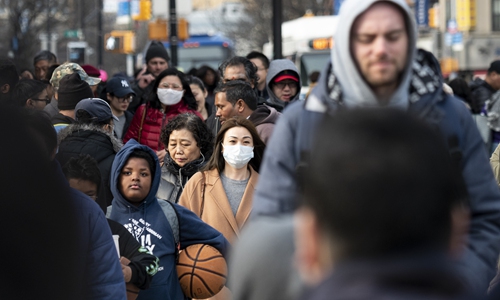HOME >> OPINION
Stigmatizing face masks undermines epidemic control in the West
By Xu Hailin Source:Global Times Published: 2020/3/9 17:58:40

People wear face masks as they walk down a street in Flushing area of Queens on Monday in New York City. Photo: AFP
Do you think it's necessary to wear a facemask to protect yourself during the spread of the deadly novel coronavirus (COVID-19) across the world? The vast majority of Chinese, and people in other Asian countries, are very likely to answer "Yes." It seems most Westerners, however, would likely give the opposite answer. That could be because many Western governments and US Centers for Disease Control and Prevention (CDC) don't recommend it.
Why is there such a contradiction? Cultural difference could be one reason.
Many Westerners have traditionally believed that only sick people need to wear a face mask. They equate face masks with illness. Chinese and people from other East Asian countries believe wearing a face mask offers two-way protection. As this Chinese allegory suggests: When a blind man was asked why he always carried a lantern when going out in the night, the man said it was for other people to see him and avoid crashing into him.
Westerners should rethink and change their stubborn idea in this regard.
Some Western governments think that masses of people wearing face masks will cause unnecessary panic, but they have neglected the severity of the novel coronavirus. They don't recommend the use of face masks by healthy people, but the skyrocketing number of infected people in Western countries is driving some people in the West to bulk-buy face masks.
The US CDC says in its prevention and treatment instructions for COVID-19 that it "does not recommend that people who are well wear a face mask to protect themselves from respiratory diseases, including COVID-19." According to the CDC, "face masks should be used by people who show symptoms of COVID-19 to help prevent the spread of the disease to others."
US CDC's recommendation comes with weird logic. Such a recommendation ignores a crucial fact about the COVID-19 - many infected people show no symptoms or only mild symptoms, which makes them unaware they are carriers and thus may boost the spread of the highly infectious virus. People who follow such official guidance could be left vulnerable to the invisible threat.
As of Sunday, Italy had reported 7,375 cases of COVID-19, but wearing face masks was still not recommended. The US reported 434 cases as of Saturday, but that number jumped to at least 511 the next day. Western countries still seem very ignorant of how we can win this crucial battle against COVID-19. This is what concerns the World Health Organization.
A shortage of face masks in Europe and the US is another reason Western countries should prevent bulk-buying, which only intensifies the shortage.
French authorities have announced it will requisition all face mask stocks and their production in the coming month, and will distribute them to medical workers and patients infected by the virus.
In the US, there are about 30 million N95 respirators in the US national stockpile, but the country needs about 10 times that number to adequately supply health care workers. A report by National Public Radio said there aren't enough domestic manufacturers for critical medical supplies such as face masks in the US to deal with COVID-19.
However, Western governments' moves to secure a supply of face masks for medical workers could in turn trigger more panic. The CDC in the US has reportedly requisitioned a medical supplier's entire supply of N95 face masks, even though the company's customers had already paid for them and the masks were set to be delivered in early March.
"I thought the government can only seize products like that in an emergency situation, which they seem to be downplaying it," Phoenix resident David Bowman was quoted as saying by CNN after his order was cancelled.
Insisting that face masks are unnecessary for healthy people amid the outbreak of the virus won't help Western governments stabilize the epidemic situation quickly.
Western governments should be more active in the battle against the COVID-19, and learn lessons from China, which is on the frontline of the fight and has gained precious experience, and do whatever they can to protect their people - even in nontraditional ways.
The author is a reporter with the Global Times. opinion@globaltimes.com.cn
Posted in: VIEWPOINT